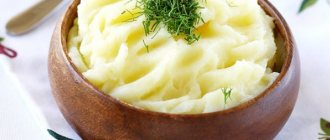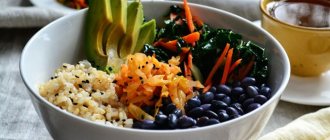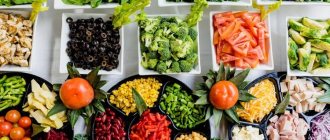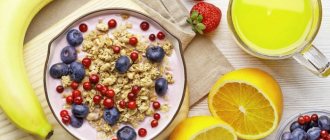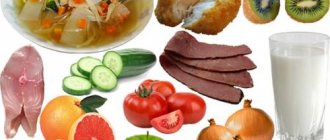General rules
Human nutrition is the basis of all processes in the body.
This is a rather complex process of intake, digestion of food, and absorption of substances by the body. Nutrition affects the body's metabolism and immunobiological state. Physiological aspects of nutrition necessarily take into account a person’s gender, age, presence of chronic diseases, nature of work, physical activity, climate, physiological conditions (pregnancy and breastfeeding). Nutritional hygiene involves the use of rational and balanced diets that meet the individual characteristics of the body. Proper nutrition maintains health, and its violation leads to the occurrence of many functional disorders of the gastrointestinal tract and diseases.
The functioning of the gastrointestinal tract is associated with a person’s mental state. If, for some reason, the regulation of digestion changes, but no pathology of the gastrointestinal tract is detected, but various digestive disorders occur, they speak of functional disorders of the gastrointestinal tract. Most often these are motor-evacuation disorders of the stomach, biliary tract and intestines. They manifest themselves in the form of stomach pain (without connection with food intake), heaviness and fullness of the stomach, nausea, heartburn , belching, constipation , diarrhea , bloating (in 30-97% of patients). Functional disorders are often accompanied by intestinal dysbiosis . The role of intestinal bacteria in the development of, for example, irritable bowel syndrome .
In this regard, these patients need:
- correction of the emotional background (sedatives - Novo-Passit , Persen );
- restorative therapy ( Carnitine , Magne B6 , riboflavin );
- use of prokinetics and prebiotics .
The nutrition of a patient who has any functional disorders of the gastrointestinal tract should be based on the principles:
- compliance with the diet (intervals between meals, conditions for its intake);
- satisfying the need for nutrients;
- ensuring energy balance (incoming and outgoing);
- diversity due to the range of permitted products and methods of their culinary processing;
- good digestibility of food, which largely depends on the composition and method of preparation.
Nutrition and digestion in persons with functional pathology of the gastrointestinal tract has some peculiarities. It is important at this stage to pay attention to diet and lifestyle changes in order to prevent the occurrence of organic pathology of the gastrointestinal tract. In practice, their transition to organic pathology is noted.
Upper gastrointestinal motility disorders accompanied by heartburn can eventually evolve into gastroesophageal reflux disease , irritable bowel syndrome into colitis , and functional dyspepsia into gastritis . In this regard, the attitude towards functional diseases must be taken seriously and include adequate treatment and nutrition.
An important task of dietary nutrition is to eliminate digestive disorders. Physiological aspects of digestion and nutrition in this case should include:
- chemical, mechanical and thermal effects of food;
- stage of the disease (exacerbation, unstable remission, remission);
- individual characteristics of digestive disorders;
- digestibility and digestibility of food.
Most often, dysfunction of the digestive organs occurs due to excessive mechanical, chemical and temperature effects of food. The chemical effect is exerted by extractive substances (fish, meat, mushrooms), essential oils of vegetables and spices, and many organic acids. Temperature effect - excessively cold or hot food. Food at a temperature close to human temperature will have minimal impact. The mechanical effect is exerted by volume, consistency, degree of grinding, food processing (cooking, stewing, baking or frying) and qualitative composition (presence of coarse fiber and connective tissue).
The main method of diet for indigestion and functional organ failure is sparing. Depending on the severity of symptoms, it has varying degrees. Thus, steamed and boiled products have a weak effect, but in case of exacerbation, the degree of their grinding and consistency are important - pureed and semi-liquid pureed dishes are indicated.
In a sparing diet, not only the stage of the disease is taken into account, but also the duration of the diet. Usually, hasty expansion of diets, as well as excessive prolongation, are avoided. Restrictions are combined with a gradual expansion of nutrition, the introduction of previously prohibited products or less crushed ones, but take into account the patient’s reaction. of Diet No. 1 can be recommended , then when the condition improves, the non-mashed version is recommended. If deterioration occurs, they return to the previous option.
The digestibility of food is characterized by the degree of secretory and motor function of the digestive organs. Digestibility is significantly reduced in case of digestive disorders. Therefore, it is advisable to exclude initially poorly digestible foods from the diet: legumes, mushrooms, tough meat of old animals with connective tissue, fatty foods, unripe fruits, overcooked foods, very fresh warm bread and pastries, hard-boiled eggs. All these products take a very long time to digest and strain the digestive system. Various cooking methods allow you to change the digestibility and digestibility of food.
Thus, for any digestive disorders it is necessary:
- fractional meals - eat food in large portions;
- eating food warm (excessively cold or hot is excluded);
- chew thoroughly and eat slowly;
- gentle nutrition (the degree of sparing depends on the severity of symptoms).
Get rid of excess fat
High-fat foods not only contribute to weight gain and cardiovascular disease.
They provoke digestive disorders and often lead to indigestion and liver disease. In addition, lovers of fatty foods often refuse vegetables and fruits, significantly depleting their diet. Starting to control the amount of fat in your diet is quite simple. To begin with, avoid frying in oil. Baked and grilled foods are no less tasty, but much healthier. Beneficial bacteria
The gastrointestinal tract of a healthy person is home to more than 400 different microorganisms. To maintain the intestinal flora in a normal state, probiotics and prebiotics are used.
Authorized Products
Diet for indigestion includes:
- Lean meats and poultry. Most often, it is recommended to use beef, chicken, turkey, and pork for cooking. The meat is prepared boiled in pieces or in the form of minced meat products (cutlets, meatballs, meatballs, zrazy, meatballs, dumplings). Fish or meat dishes are included in the diet once a day.
- Low-fat soups made with vegetable broths or water, cereals (oatmeal, semolina, buckwheat, rice) with finely chopped vegetables. If necessary, soups are pureed or the ingredients included in them are well kneaded. There are a lot of options for preparing soups: puree soup, cream soup, soups with boiled minced meat, with egg and milk dressing. Avoid eating okroshka, borscht, and cabbage soup.
- Dried wheat bread, crackers (not too browned), biscuits.
- Low-fat varieties of fish, cooked in pieces or products made from cutlet mass. The best choice for preparing steamed and boiled fish dishes would be pike, hake, pollock, blue whiting, ice fish, and notothenia.
- Homemade milk and cream sauces.
- Puree of vegetables without high fiber content (potatoes, carrots, zucchini, pumpkin, squash). The puree is made with milk and butter; if desired, you can prepare a vegetable soufflé from the listed vegetables.
- Well-boiled (or mashed) porridge with water or with the addition of milk. To prepare them, use buckwheat, oatmeal, rice or semolina.
- Milk, low-sour cottage cheese, casseroles and cottage cheese souffles. If tolerated well, you can drink whole milk, as well as fermented milk drinks.
- Soft-boiled eggs or steam omelet.
- Baked apples and pears, various berries are better in processed form (baked, lightly boiled, jelly, mousse).
- Weak tea with milk, bran decoction, juices (diluted fruit, carrot), filtered water, rose hip drink.
- Confectionery products (caramel, meringues, meringues, marshmallows, marshmallows) are consumed very limited, as they can increase flatulence and heartburn.
Table of permitted products
| Proteins, g | Fats, g | Carbohydrates, g | Calories, kcal | |
Vegetables and greens | ||||
| zucchini | 0,6 | 0,3 | 4,6 | 24 |
| broccoli | 3,0 | 0,4 | 5,2 | 28 |
| carrot | 1,3 | 0,1 | 6,9 | 32 |
| cucumbers | 0,8 | 0,1 | 2,8 | 15 |
| salad pepper | 1,3 | 0,0 | 5,3 | 27 |
| parsley | 3,7 | 0,4 | 7,6 | 47 |
| iceberg lettuce | 0,9 | 0,1 | 1,8 | 14 |
| pumpkin | 1,3 | 0,3 | 7,7 | 28 |
| dill | 2,5 | 0,5 | 6,3 | 38 |
Fruits | ||||
| bananas | 1,5 | 0,2 | 21,8 | 95 |
| apples | 0,4 | 0,4 | 9,8 | 47 |
Nuts and dried fruits | ||||
| dried figs | 3,1 | 0,8 | 57,9 | 257 |
| dried apricots | 5,2 | 0,3 | 51,0 | 215 |
| dried apricots | 5,0 | 0,4 | 50,6 | 213 |
| prunes | 2,3 | 0,7 | 57,5 | 231 |
Cereals and porridges | ||||
| buckwheat (kernel) | 12,6 | 3,3 | 62,1 | 313 |
| oat groats | 12,3 | 6,1 | 59,5 | 342 |
| rice | 6,7 | 0,7 | 78,9 | 344 |
Flour and pasta | ||||
| buckwheat noodles | 14,7 | 0,9 | 70,5 | 348 |
Bakery products | ||||
| white bread crackers | 11,2 | 1,4 | 72,2 | 331 |
| wheat bread | 8,1 | 1,0 | 48,8 | 242 |
Confectionery | ||||
| jam | 0,3 | 0,2 | 63,0 | 263 |
| jelly | 2,7 | 0,0 | 17,9 | 79 |
| marshmallows | 0,8 | 0,0 | 78,5 | 304 |
| milk candies | 2,7 | 4,3 | 82,3 | 364 |
| fondant candies | 2,2 | 4,6 | 83,6 | 369 |
| fruit and berry marmalade | 0,4 | 0,0 | 76,6 | 293 |
| paste | 0,5 | 0,0 | 80,8 | 310 |
| Maria cookies | 8,7 | 8,8 | 70,9 | 400 |
Raw materials and seasonings | ||||
| honey | 0,8 | 0,0 | 81,5 | 329 |
| sugar | 0,0 | 0,0 | 99,7 | 398 |
Dairy | ||||
| kefir 1.5% | 3,3 | 1,5 | 3,6 | 41 |
| Ryazhenka | 2,8 | 4,0 | 4,2 | 67 |
Cheeses and cottage cheese | ||||
| cottage cheese 1% | 16,3 | 1,0 | 1,3 | 79 |
Meat products | ||||
| beef | 18,9 | 19,4 | 0,0 | 187 |
| rabbit | 21,0 | 8,0 | 0,0 | 156 |
Bird | ||||
| boiled chicken breast | 29,8 | 1,8 | 0,5 | 137 |
| boiled turkey fillet | 25,0 | 1,0 | — | 130 |
Eggs | ||||
| soft-boiled chicken eggs | 12,8 | 11,6 | 0,8 | 159 |
Fish and seafood | ||||
| flounder | 16,5 | 1,8 | 0,0 | 83 |
| pollock | 15,9 | 0,9 | 0,0 | 72 |
| cod | 17,7 | 0,7 | — | 78 |
| hake | 16,6 | 2,2 | 0,0 | 86 |
Oils and fats | ||||
| butter | 0,5 | 82,5 | 0,8 | 748 |
| olive oil | 0,0 | 99,8 | 0,0 | 898 |
| sunflower oil | 0,0 | 99,9 | 0,0 | 899 |
Non-alcoholic drinks | ||||
| water | 0,0 | 0,0 | 0,0 | — |
| green tea | 0,0 | 0,0 | 0,0 | — |
Juices and compotes | ||||
| apricot juice | 0,9 | 0,1 | 9,0 | 38 |
| carrot juice | 1,1 | 0,1 | 6,4 | 28 |
| peach juice | 0,9 | 0,1 | 9,5 | 40 |
| plum juice | 0,8 | 0,0 | 9,6 | 39 |
| pumpkin juice | 0,0 | 0,0 | 9,0 | 38 |
| rose hip juice | 0,1 | 0,0 | 17,6 | 70 |
| * data is per 100 g of product | ||||
Normalization of intestinal function after taking antibiotics
The problem with antibiotics is that in addition to clearing the body of dangerous “germs,” they also eliminate good bacteria, which means they can reduce immune function and increase the risk of infections, allergies, and disease. Although antibiotics can save lives when they are truly needed, they are often used incorrectly and unnecessarily.
Over time, dangerous bacteria can become resistant to antibiotics, making it difficult to fight serious infections. Before taking or giving antibiotics to your children, make sure it is really necessary and talk to your doctor about alternative options.
Impact of commonly used drugs on the composition and metabolic function of the gut microbiota
How to restore balance in the intestines?
You can restore the functioning of the gastrointestinal tract after taking antibiotics or prevent complications of antibiotic therapy by normalizing the intestinal microflora.
- Take probiotics
. High quality probiotics help restore the gut back into balance. Giving your gut a fresh supply of probiotics every day is an important part of keeping your gut and immune system in harmony.
- Feed your probiotics with prebiotics
. Beneficial gut bacteria require a special diet consisting of prebiotic fiber. Prebiotics support probiotics and allow them to produce beneficial compounds such as short-chain fatty acids.
- Eat healthy foods
. It is better to completely exclude sweet, fatty, processed foods from the diet during this time. Fresh, natural, whole foods provide the nutrients and fiber your gut needs to maintain a healthy balance.
- Regular exercise
. Moderate physical activity increases the population of probiotics and enriches their diversity. Exercise improves the health of your microbiome, as well as your overall health.
We recommend
“Causes of malnutrition and gluttony. List of the most harmful foods and associated health problems" Read more
Products that should be included in the diet.
- Bone broth
contains collagen and the amino acids proline and glycine, which can help heal damaged cell walls.
- Fermented foods
- they contain organic acids that balance intestinal pH and probiotics for gut support. Sauerkraut, kimchi and kvass are excellent sources.
- Coconut products
- The medium chain fatty acids in coconut are thought to be easier to digest than other fats, so they work well to support a healthy digestive system.
- Sprouted seeds
Chia seeds, flaxseeds, and hemp seeds are excellent sources of fiber, which can help support the growth of beneficial bacteria.
- Healthy fats
- Eating healthy fats in moderation, such as egg yolks, avocados, ghee and coconut oil, is great for your gut and aids in nutrient absorption.
- Eating 1-2 servings of fruit per day
is a good way to get vitamins and minerals, but remember to eat fruit in moderation.
Fully or partially limited products
The following should be excluded from the diet:
- Broths, fried and spicy first and second courses, animal fats, fatty meats, smoked meats and sausages.
- Pickled and pickled vegetables.
- Mushrooms, onions, garlic, legumes, radishes, radishes, white cabbage, raw berries.
- Cereals are millet, barley, pearl barley and corn, which are coarse and difficult to digest.
- Hot sauces, vinegar, ketchup, tomato paste, mayonnaise, horseradish, pepper, spices, mustard.
- Strong tea and coffee, kvass, carbonated drinks, sour fruit juices.
Table of prohibited products
| Proteins, g | Fats, g | Carbohydrates, g | Calories, kcal | |
Vegetables and greens | ||||
| canned vegetables | 1,5 | 0,2 | 5,5 | 30 |
| eggplant | 1,2 | 0,1 | 4,5 | 24 |
| swede | 1,2 | 0,1 | 7,7 | 37 |
| peas | 6,0 | 0,0 | 9,0 | 60 |
| cabbage | 1,8 | 0,1 | 4,7 | 27 |
| bulb onions | 1,4 | 0,0 | 10,4 | 41 |
| chickpeas | 19,0 | 6,0 | 61,0 | 364 |
| radish | 1,2 | 0,1 | 3,4 | 19 |
| white radish | 1,4 | 0,0 | 4,1 | 21 |
| tomatoes | 0,6 | 0,2 | 4,2 | 20 |
| beans | 7,8 | 0,5 | 21,5 | 123 |
| horseradish | 3,2 | 0,4 | 10,5 | 56 |
| spinach | 2,9 | 0,3 | 2,0 | 22 |
| sorrel | 1,5 | 0,3 | 2,9 | 19 |
Berries | ||||
| grape | 0,6 | 0,2 | 16,8 | 65 |
Mushrooms | ||||
| mushrooms | 3,5 | 2,0 | 2,5 | 30 |
| marinated mushrooms | 2,2 | 0,4 | 0,0 | 20 |
Nuts and dried fruits | ||||
| nuts | 15,0 | 40,0 | 20,0 | 500 |
| raisin | 2,9 | 0,6 | 66,0 | 264 |
| almond | 18,6 | 57,7 | 16,2 | 645 |
Snacks | ||||
| potato chips | 5,5 | 30,0 | 53,0 | 520 |
Flour and pasta | ||||
| pasta | 10,4 | 1,1 | 69,7 | 337 |
| noodles | 12,0 | 3,7 | 60,1 | 322 |
| vareniki | 7,6 | 2,3 | 18,7 | 155 |
| dumplings | 11,9 | 12,4 | 29,0 | 275 |
Bakery products | ||||
| buns | 7,9 | 9,4 | 55,5 | 339 |
| Rye bread | 6,6 | 1,2 | 34,2 | 165 |
| bran bread | 7,5 | 1,3 | 45,2 | 227 |
| whole grain bread | 10,1 | 2,3 | 57,1 | 295 |
Confectionery | ||||
| pastry cream | 0,2 | 26,0 | 16,5 | 300 |
| shortbread dough | 6,5 | 21,6 | 49,9 | 403 |
Ice cream | ||||
| ice cream | 3,7 | 6,9 | 22,1 | 189 |
Chocolate | ||||
| chocolate | 5,4 | 35,3 | 56,5 | 544 |
Raw materials and seasonings | ||||
| mustard | 5,7 | 6,4 | 22,0 | 162 |
| mayonnaise | 2,4 | 67,0 | 3,9 | 627 |
Dairy | ||||
| milk 4.5% | 3,1 | 4,5 | 4,7 | 72 |
| cream 35% (fat) | 2,5 | 35,0 | 3,0 | 337 |
| whipped cream | 3,2 | 22,2 | 12,5 | 257 |
Cheeses and cottage cheese | ||||
| parmesan cheese | 33,0 | 28,0 | 0,0 | 392 |
Meat products | ||||
| fatty pork | 11,4 | 49,3 | 0,0 | 489 |
| salo | 2,4 | 89,0 | 0,0 | 797 |
| bacon | 23,0 | 45,0 | 0,0 | 500 |
Sausages | ||||
| smoked sausage | 9,9 | 63,2 | 0,3 | 608 |
Bird | ||||
| smoked chicken | 27,5 | 8,2 | 0,0 | 184 |
| duck | 16,5 | 61,2 | 0,0 | 346 |
| smoked duck | 19,0 | 28,4 | 0,0 | 337 |
| goose | 16,1 | 33,3 | 0,0 | 364 |
Fish and seafood | ||||
| smoked fish | 26,8 | 9,9 | 0,0 | 196 |
| black caviar | 28,0 | 9,7 | 0,0 | 203 |
| salmon caviar granular | 32,0 | 15,0 | 0,0 | 263 |
| salmon | 19,8 | 6,3 | 0,0 | 142 |
| canned fish | 17,5 | 2,0 | 0,0 | 88 |
| salmon | 21,6 | 6,0 | — | 140 |
| trout | 19,2 | 2,1 | — | 97 |
Oils and fats | ||||
| animal fat | 0,0 | 99,7 | 0,0 | 897 |
| cooking fat | 0,0 | 99,7 | 0,0 | 897 |
Alcoholic drinks | ||||
| dry red wine | 0,2 | 0,0 | 0,3 | 68 |
| vodka | 0,0 | 0,0 | 0,1 | 235 |
| beer | 0,3 | 0,0 | 4,6 | 42 |
Non-alcoholic drinks | ||||
| soda water | 0,0 | 0,0 | 0,0 | — |
| cola | 0,0 | 0,0 | 10,4 | 42 |
| instant coffee dry | 15,0 | 3,5 | 0,0 | 94 |
| sprite | 0,1 | 0,0 | 7,0 | 29 |
Juices and compotes | ||||
| tomato juice | 1,1 | 0,2 | 3,8 | 21 |
| * data is per 100 g of product | ||||
Menu (Power Mode)
The diet is quite varied, and its complete composition allows it to be used for a long time and even constantly. The main thing is not to violate food preparation methods and not to deviate from the list of permitted products. In the daily menu you need to alternate protein and cereal dishes so that the food does not seem monotonous. If the patient tolerates dairy products well, they may be preferred since milk protein is easier to digest.
| Breakfast |
|
| Lunch |
|
| Dinner |
|
| Afternoon snack |
|
| Dinner |
|
| For the night |
|
| Breakfast |
|
| Lunch |
|
| Dinner |
|
| Afternoon snack |
|
| Dinner |
|
| For the night |
|
| Breakfast |
|
| Lunch |
|
| Dinner |
|
| Afternoon snack |
|
| Dinner |
|
| For the night |
|
Reviews and results
There are quite a lot of people suffering from various digestive disorders. However, the first symptoms, such as belching, periodic heartburn and constipation, heaviness in the epigastrium and discomfort in the right hypochondrium, often remain without due attention. The intensification of these symptoms forces patients to be examined, treated and follow a diet. Reviews indicate the effectiveness of dietary nutrition even with short-term implementation.
- “... Heartburn and bloating are rare, but I understand that this is not the norm. I don’t have time to get examined, but I decided to follow the diet. I switched to porridge, boiled vegetables and fish, and for dinner I cook porridge with milk (I tolerate it normally without bloating or heartburn). I excluded spicy foods, fried foods, smoked sausage, baked goods, and greatly reduced sweets. After just 2 weeks I noticed the absence of heartburn and flatulence. I think if you constantly eat like this, you can get rid of these unpleasant symptoms. After two months of following the diet, I lost 4 kg and became healthier.”
- “... The condition of the gastrointestinal tract (heaviness in the stomach, belching, bloating) forced me to be examined. No significant pathology was found - mild gastritis, the liver and gallbladder were normal. The treatment prescribed was De-nol, chamomile decoction and dietary nutrition. The transition to steamed cutlets, boiled chicken meat, porridge and light soups with water was not difficult, and I survived the month of the diet normally. Sometimes I allowed myself custard cake with protein cream or low-fat cookies. But I decided not to eat fried and smoked foods, as they cause belching and constipation.”
- “... From my own experience I can say that in case of stomach diseases, proper nutrition is simply necessary. An exacerbation, which happens once a year, forces you to follow a diet, but if you stick to it constantly, you can avoid exacerbations. I noticed that an abundance of fried or spicy foods first causes heartburn, and after a few days heaviness in the stomach begins. Twice a day I eat porridge (including milk), cottage cheese, casseroles cooked in a slow cooker, soups and boiled fish. I take cutlets or boiled chicken to work for lunch. I can handle this diet well, the only difficulty is that I need to cook for myself separately.”
Green vegetables
Vegetables colored green (broccoli, spinach, Brussels sprouts) are a source of insoluble fiber, which improves intestinal motility and speeds up the passage of food within standard speed limits. This helps eliminate constipation and speed up metabolism.
Green vegetables, according to American scientists, are also rich in various microelements, in particular magnesium, which increases the tone of smooth muscles, leading to faster excretion of feces.
Spinach has a separate set of properties. It is capable of capturing a number of toxic substances, including decay products, and removing them from the body.
Sugar compounds, which are extremely abundant in leafy greens, create a favorable environment for the proliferation of beneficial flora. In addition, Brussels sprouts inhibit the processes of protein synthesis in pathogenic microorganisms.
Green vegetables normalize the contractile activity of the intestine and form a “healthy” intestinal microbiocenosis.



